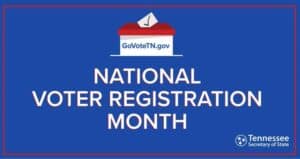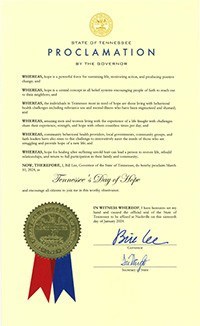Tennessee’s Opioid Abatement Council (OAC) today released its second Announcement of Funding for Community Grants. This offering will add $20 million dollars for approved opioid remediation activities to the tens of millions of dollars that are already flowing to provide services across the state.
The funding available through this grant application process comes from hundreds of millions of dollars in proceeds from lawsuits against opioid manufacturers, distributors, and pharmacies negotiated by the Tennessee Attorney General’s Office. According to legislation passed by the Tennessee General Assembly, these proceeds are first split with 15% going to the state and 15% going to county governments and 70% going to the Opioid Abatement Trust Fund. The dollars in the trust fund are split again with 35% going directly to the counties for approved opioid abatement activities and 65% going to the Opioid Abatement Council for community grant applications. This last, largest percentage is made available through a competitive grant application process.
The Announcement of Funding outlines the process for application including criteria for constructing grant applications, designing programs, building partnerships, and reporting outcomes. Proposers must design programs that impact opioid use disorder their communities using methods contained in the approved remediation list including: Primary Prevention, Harm Reduction, Treatment, Recovery Support, Education/Training, or Research/Evaluation of Abatement Strategy Efficacy.
This second funding opportunity follows more than $78 million in community grants awarded by the council earlier this year. Most contracts for those grants are in place, and initial funds have been issued to pay for services. The council has also made two rounds of payments from the Opioid Abatement Trust Fund to county governments in 2023 and 2024 totaling $62 million to fund their approved remediation activities.
“Tennessee’s Opioid Abatement Council continues to deliver much needed help for people across our great state,” said Tennessee Attorney General Jonathan Skrmetti. “The additional $20 million for Community Grants means more support for Tennessee families and communities struggling with the opioid epidemic. My office worked hard to endow our Opioid Abatement Fund by holding corporations accountable for their role in the opioid crisis, and it is gratifying to see the money put to good use.”
“What we said all along was that we wanted the hard-earned proceeds that the team at the Attorney General’s Office won for Tennesseans to get out the door and start to undo the damage done by the opioid lawsuit defendants,” said Steve Loyd, MD, Opioid Abatement Council Chairman. “Our actions are proving yet again that Tennessee is a leader in efficiently and effectively applying these funds to save lives and do the most good.”
“What we’re looking for in this second Announcement of Funding is to break new ground with organizations doing great work. We want to hear from the grassroots, local agencies who see the need in their community and want to respond in innovative, collaborative ways,” said Mary Shelton, TN Opioid Abatement Council Executive Director. “Because the hurt across our state is so great, we know there are even more organizations creating space for healing who can utilize this funding.”
“We’re so grateful for the dedication and hard work of the Opioid Abatement Council members and staff to ensure that these funds get out to the communities that need them the most, and we’re especially grateful to the grantees who are truly creating collaborative pathways to recovery, resilience, and independence for people and communities so greatly impacted by the opioid crisis,” said Marie Williams, LCSW, Tennessee Department of Mental Health and Substance Abuse Services Commissioner.
Applicants interested in submitting proposals to the Opioid Abatement Council can do so through the council’s website at TN.gov/oac. Council staff worked with the Department of Finance and Administration’s Strategic Technology Solutions to customize a web-based portal for application, evaluation, and tracking. The portal will be open for groups to submit proposals November 12 through December 13, 2024.



